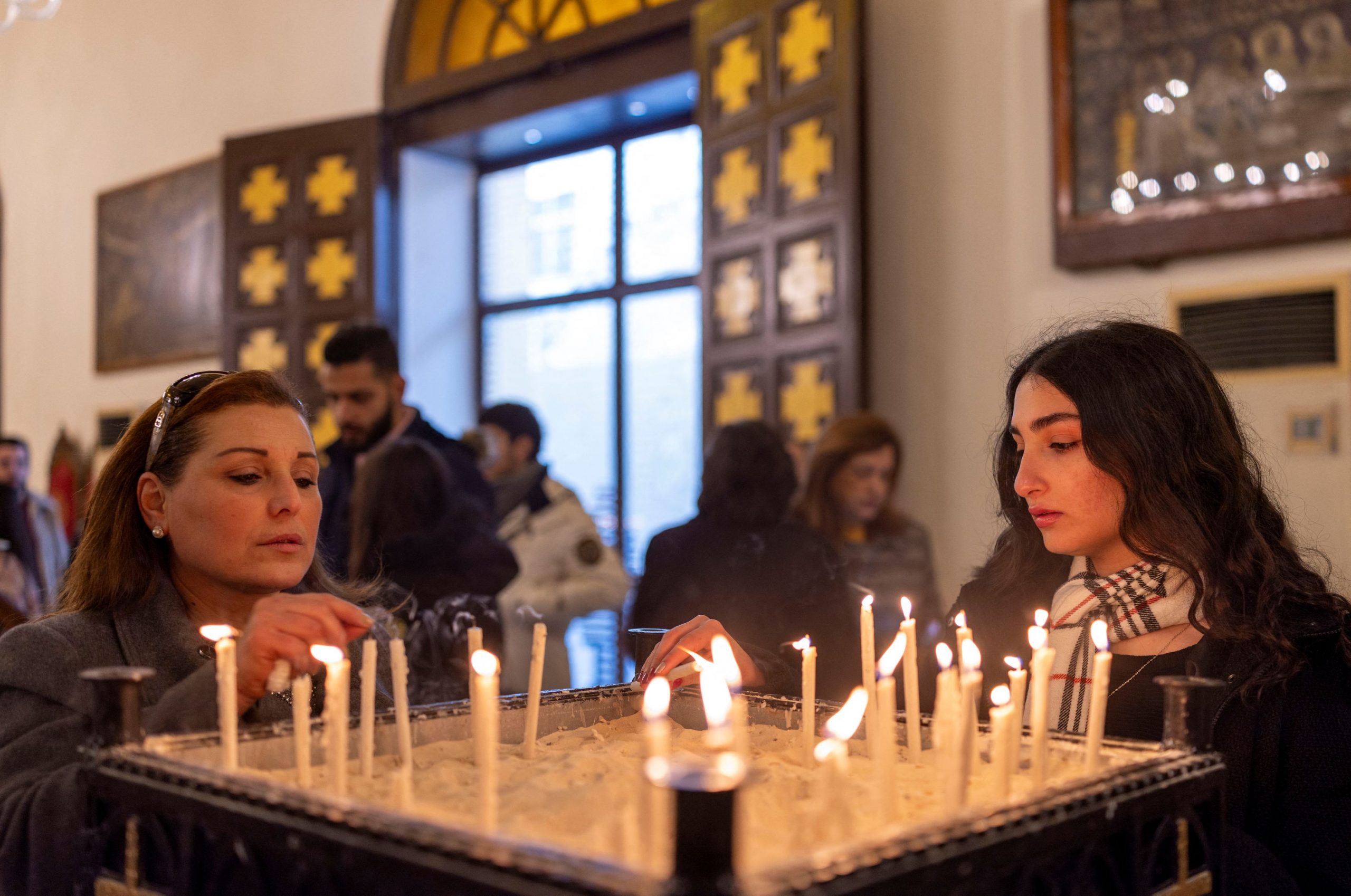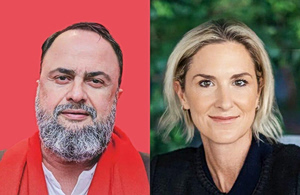In the western Syrian enclave of Wadi al-Nasara, or Valley of the Christians, the sound of church bells rang through the streets and people put up Christmas trees this week.
So far, life for people in Syria’s ancient Christian community hasn’t been disrupted by the toppling of President Bashar al-Assad . But there is anxiety about what comes next under the rule of the Islamist-led groups who have taken power in the country.
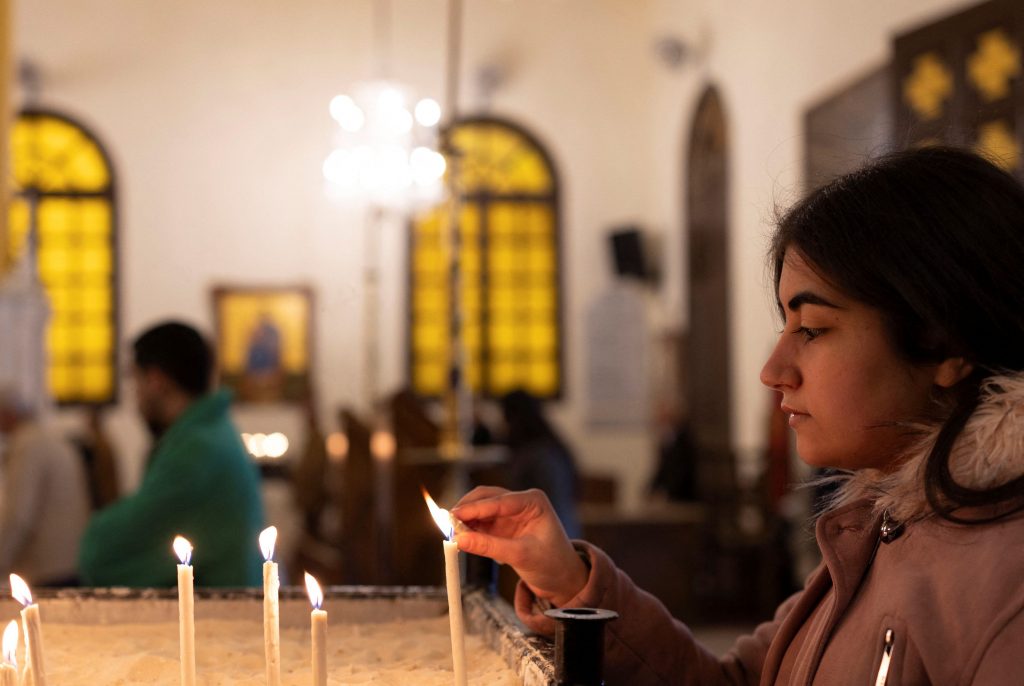
A girl lights a candle as members of the Orthodox community of Latakia attend a Sunday Mass conducted by Athanasios Fahed, Metropolitan of Latakia and its dependencies for the Greek Orthodox, at St. George’s Cathedral in Latakia, Syria, December 15, 2024. REUTERS/Umit Bektas
“They’re asking the Christians to keep practicing all their religious affairs and celebrate Christmas fully,” said Ammar Fakhouri , a charity worker in the valley’s al-Mouzeina village. “We are still scared of the unknown future and haven’t reached the stage of full confidence, but their words and actions and respect for everyone reduces this fear a little.”
During decades of Assad family rule , Christians and Muslims lived side by side with minimal friction, but Christian communities were severely tested by the civil war that broke out in 2011. As the conflict took on sectarian overtones, Christians largely sided with the regime, or at least declined to actively oppose it. Many members of the church had longstanding ties with the regime and intelligence services that shaped their stance.
The rebels have largely sought to reassure religious and ethnic minorities that they will have full rights and equality with the Muslim majority. Whether they make good on that promise could determine the fate of one of the world’s oldest Christian populations, made up of vibrant, if dwindling, communities of various ancient sects: Syrian Orthodox, Syrian Catholics, Greek Orthodox, Greek Catholics and Armenian Orthodox.
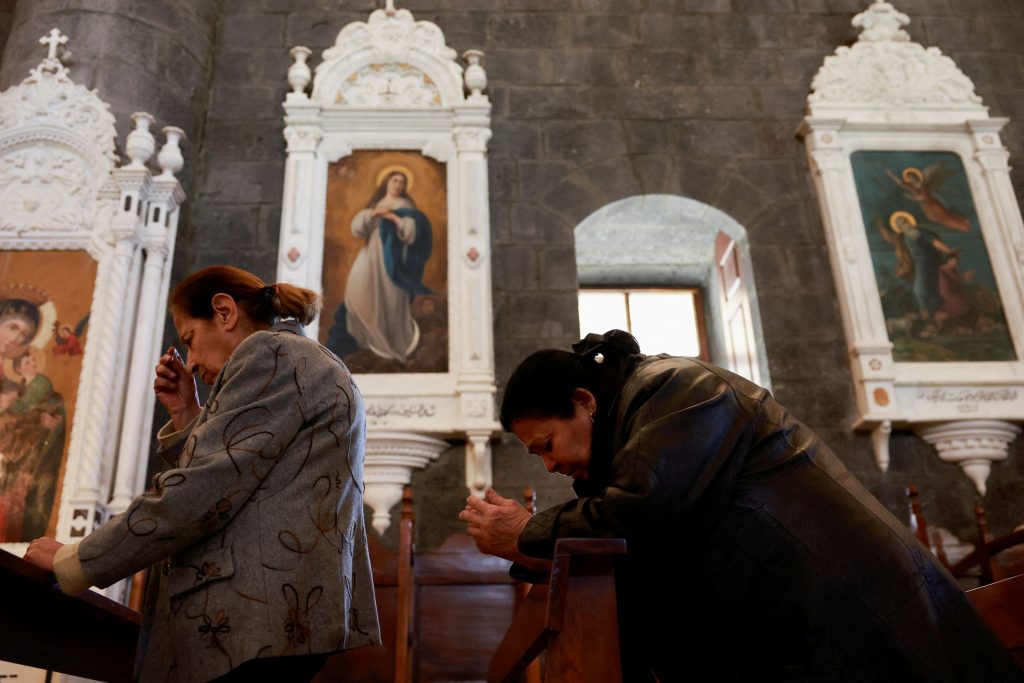
Christians attend the first Sunday mass after the fighters of the ruling Syrian body took control of the city, following the ousting of Syria’s Bashar al-Assad, at Zaitoun Church in Damascus, Syria, December 15, 2024. REUTERS/Ammar Awad TPX IMAGES OF THE DAY
When the rebels conquered Aleppo late last month, followed by Homs and ultimately the capital Damascus, they distributed bread and children’s gifts in Christian neighborhoods, telling residents they had nothing to fear.
Yet, in a sign of their sense of foreboding, some Christian store owners are refraining from selling alcohol, which Islamists consider sinful, or are doing so discreetly. Residents of Homs say armed men tried to shut liquor stores and remove crosses from Christians’ cars. Those appear to be isolated incidents so far, and contrary to the stated policy of the country’s newly empowered leaders.
“We are still in the province of promises,” an Armenian Christian businessman from Aleppo said. “Is what’s happening just propaganda to gain trust abroad and maybe later it changes, or is this something real? We need time.”
The treatment of minorities, including Syria’s Christians, will be a test for the rebel forces. Hayat Tahrir al-Sham , the leading group and a former al Qaeda affiliate, has sought in recent years to distance itself from its extremist origins.
HTS is designated a terrorist organization by the U.S., the European Union and the United Nations. It will likely have to convince the West that it can protect minorities if it wants to lose the designation, be freed from sanctions, secure aid in rebuilding and reintegrate Syria into the global economy. Its ability to do so will also be a sign of whether Syria can unify under one government or will be plagued by potentially years of internecine strife.
Islamist rebels have struck many of the right notes in their public statements so far. They have pledged equal rights for all Syrians, forbidden discrimination based on religion or ethnicity, and vowed to protect churches and religious schools.
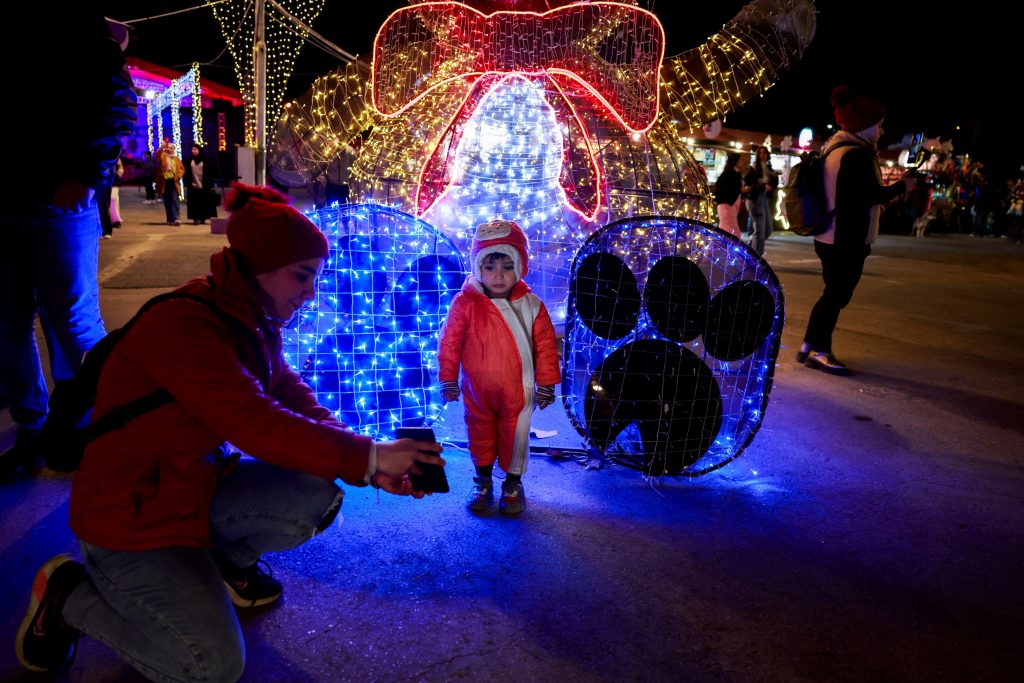
A child poses for pictures by a Christmas decoration in Damascus, after Syria’s Bashar al-Assad was ousted, in Damascus, Syria December 19, 2024. REUTERS/Ammar Awad
In a series of meetings this week with local Christian leaders, commanders from HTS said they wanted all Syrians to feel safe and welcome in their country.
In the coastal city of Tartus, an HTS commander named Sheikh Ala met recently with some 100 civic and religious leaders, including Christian clergy. As he was introduced, some attendees intoned a typical Islamist chant of God is great. With a beard and shaved upper lip favored by hard-line Salafi Muslims, Ala called the members of other sects his brothers.
“You are our people and we are your sons,” he said. “We have no division or discrimination, God willing. All people are united, and security is for everyone.”
Jiris Jabra , a Christian resident of Tartus, said he was relieved to be rid of Assad. “We are optimistic, because those who toppled the regime are taking steps that ensure safety and security,” he said.
Few places are as central as Syria to the long history of Christianity. Saul of Tarsus made his conversion there, according to the Bible, on the Street Called Straight, which still exists in Damascus. It was in these lands that he, renamed as Paul, conducted his first missions as an apostle.
Despite the rebels’ message of tolerance, Christians fear a return to earlier days, when a famed Damascus church was razed in the eighth century to make way for the Umayyad Mosque —today one of Islam’s holiest sites—and they were relegated to second-class status for hundreds of years under Ottoman rule.
More recently in the civil war, clergy and ordinary Christians were repeatedly targeted or caught in the crossfire. When Islamic State surged to power in eastern Syria a decade ago, it kidnapped and killed Christians.
HTS leader Abu Mohammed al-Jawlani , once a member of al Qaeda and Islamic State, later broke with both groups and steered his faction away from the global jihadist movement that wages war on the West. The interim prime minister, whom Jawlani appointed this week, appeared in televised remarks in front of the Syrian revolutionary flag and an Islamic banner, stirring criticism. In a subsequent interview with Al Jazeera, only the Syrian flag was present.
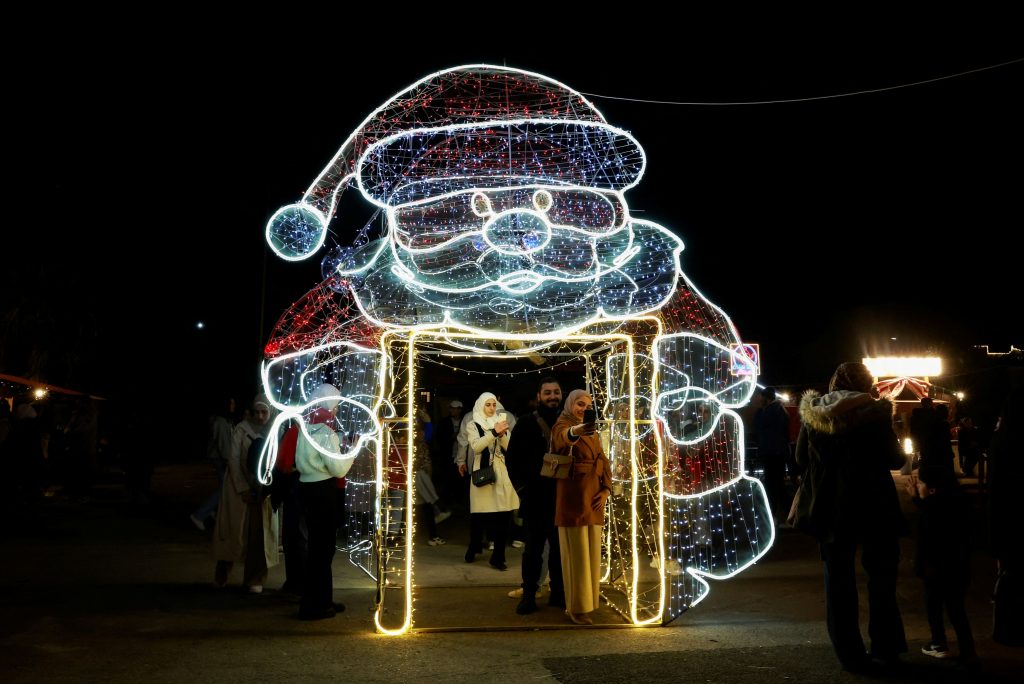
People pose for pictures by Christmas decorations in Damascus, after Syria’s Bashar al-Assad was ousted, in Damascus, Syria December 19, 2024. REUTERS/Ammar Awad
Accurate estimates of Syria’s Christian population are hard to come by. Recent figures provided by international charities and local communities estimate it at anywhere between 200,000 and 600,000. That puts it at as little as 1.5% of the country’s population, which itself has shrunk by a massive refugee outflow. Christians made up around 10% of the Syrian population before the war.
In Aleppo, the numbers have dwindled to fewer than 30,000 from as many as 500,000, according to some of the groups. Few Christians remain in Idlib, the northwestern city that became the base for HTS and a de facto statelet under their rule in recent years, as it battled the Assad regime.
Many Christians initially fled last month’s rebel advances on Aleppo and Homs, taking shelter in coastal areas seen as a regime stronghold, but most of them returned within days to guard their properties.
When the regime fell, Christians in the Damascus suburb of Sahnaya celebrated outside Mar Elias Church, whose bells were ringing. “One, one, one! The Syrian people are one,” they chanted Sunday beside a Christmas tree, according to a video verified by Storyful, which is owned by News Corp, the parent company of The Wall Street Journal.
The Christian owner of a travel agency in Aleppo said he stayed there throughout the war with his elderly parents, wife and their two children.
The 42-year-old said although he’s hopeful about the future for Syria, he is still considering migrating abroad, because he believes the region will continue to be torn by conflict.
It is a common attitude among young Christians, even though their exodus will threaten the community’s historical presence in Syria.
“After 30 or 40 years, there won’t be any Christians in Syria, because everyone will leave,” he said. “Those who can’t leave, after 40 years they will be elderly or dead.”
Meghrig Kalenderian , a 30-year-old Armenian from the northwestern Syrian city of Kassab who moved to Dubai in 2021, is worried that Syria’s new rulers will curtail the tolerant lifestyle she was used to, barring alcohol and forcing women to cover their hair.
“They were part of ISIS and al Qaeda, so how can I trust someone who was a terrorist two days ago?” she said.
Write to Stephen Kalin at stephen.kalin@wsj.com
